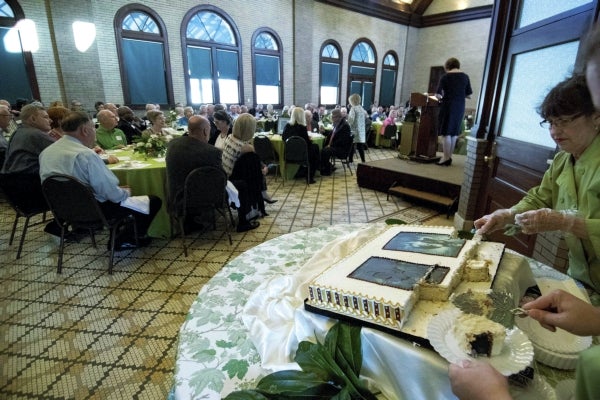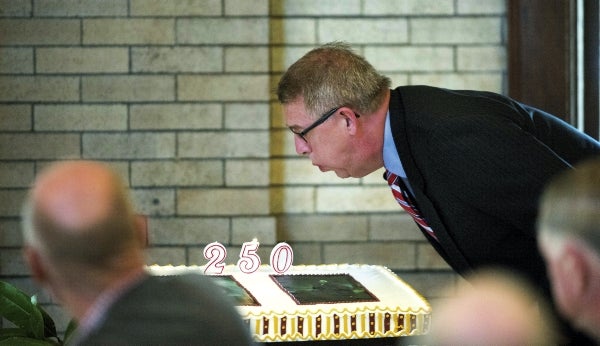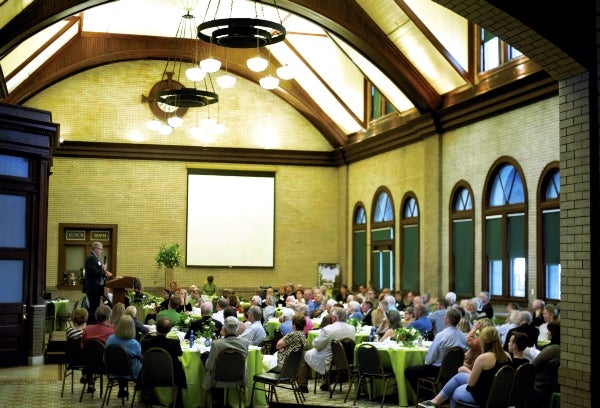It was an ‘Old Hickory’ kind of night for Historic Salisbury Foundation
Published 12:00 am Thursday, April 13, 2017
By Mark Wineka
mark.wineka@salisburypost.com
SALISBURY — Everything seemed to come up Andrew Jackson on Wednesday.
Yes, that Andrew Jackson — “Old Hickory,” if you will. It’s a little bit of a stretch, but you could call Jackson one of Salisbury’s favorite sons.
He studied law here for three years, from 1784 until he was licensed as a 19- or 20-year-old attorney in 1787. Jackson Street is named for him.
The desk he used as a law student under Judge Spruce Macay is kept in the upstairs hallway of the Hall House Museum. It’s probable Jackson drank from the old water well, still preserved as a landmark, on the grounds of Rowan Public Library.
Salisbury has an Andrew Jackson Society — an arm of Historic Salisbury Foundation — and an Andrew Jackson Masonic Lodge.
Historic Salisbury Foundation held its annual meeting Wednesday night at the Salisbury Station, and part of the event — beyond the normal business meeting — celebrated the 250th anniversary of the year (1767) of Jackson’s birth.
To mark that anniversary, HSF brought in Judge Andrew Jackson VI of Knoxville, Tennessee, as the guest speaker.
Jackson VI, who has often given talks about Andrew Jackson at the Hermitage, the seventh president’s home in Tennessee, said it was exciting to be in the presence of the Salisbury desk and walk the streets of the town where the man who would be president essentially started his adulthood.
Jackson VI regaled the good-sized crowd with accounts of the original Jackson’s tough, impoverished upbringing in the Waxhaw region of North and South Carolina and the skinny, quarrelsome, hell-raising, tenacious man he would become, always dogged by controversies, fights and even duels that left him wounded.
But in the end, the great-great-great-grandson said, “Andrew Jackson was a man of the people.
“He was the personification of the self-made man.”
Andrew Jackson truly showed Americans for the first time they could start out with nothing and rise to the highest office in the land, the judge said.
Jackson served as president from 1829 to 1837, but as a child courier for rebel forces he was captured, becoming a British prisoner of war in Camden, South Carolina. When he refused to polish a British officer’s boots, Jackson was left with permanent scars on his left hand and on his face from the officer’s sword.
During the Revolutionary War, Jackson lost both of his brothers — one in a battle, the other to sickness — and he was an orphan by age 14. He came to Salisbury still a teen, and as Jackson VI puts it, “He was a wild critter around here.”
There was the time Jackson and his buddies broke up a Salisbury tavern and caused $500 in damage, “which was a lot of money back then,” Jackson VI said.
And there was that occasion Jackson, a good dancer, organized a Christmas dance and among invitees to the ball were two ladies of the night.
It was only the start to Jackson’s colorful journey to the presidency.
HSF had a birthday cake in Andrew Jackson’s honor Wednesday evening, and Jackson VI blew out the candles — not 250 candles, but several nonetheless.
HSF President Susan Sides also presented Jackson VI with a sketch of the Judge Spruce Macay (pronounced McCoy) law office where Jackson studied. It no longer stands. And with that sketch was a copied photograph of the boarding house (also gone) where Jackson lived while he was in Salisbury.
Jackson VI, who stayed overnight at the On the Pond bed-and-breakfast in Salisbury, also was presented Andrew Jackson Society glassware.
The Andrew Jackson desk was transported to the depot for the evening, and it stood next to a large portrait of Andrew Jackson.
Andrew Jackson VI is a Marine, University of Tennessee graduate, former prosecutor and general sessions judge in Knox County, Tennessee. Andrew Jackson and his wife, Rachel, never had any biological children of their own, but they adopted three sons, including the son of Rachel’s brother.
That son was given the name of Andrew Jackson Jr., and Andrew Jackson VI descends directly from him.
HSF Executive Director Karen Hobson reviewed the past year for members and reminded them of the foundation’s role in revitalizing older neighborhoods, adding character to the city, transforming dilapidated structures, working in West End, showcasing Salisbury with OctoberTour, educating new generations on the past, opening city landmarks, being good stewards of those landmarks, salvaging old building products and finding new owners for important properties.
Hobson delivered good news Wednesday that the Low House, a house at 506 Bringle Ferry Road that HSF had saved and has been trying to sell for two years, is close to being purchased and put back in private hands.
The news on turning around the house at 128 W. Thomas St. — once dubbed “The House That Disappeared” because of its being hidden by vegetation — was not as promising.
“The outcome remains far from clear,” Hobson said. “(But) we have not given up.”
HSF and Livingstone College are continuing their partnership in trying to restore six West Monroe Street houses. Work is almost complete on the Lynch-Nicholson House at 624 W. Monroe.
HSF concentrated on the exterior of the house and Livingstone College, the interior. It will become housing for a Livingstone faculty member.
Next on the list for 2017 is the Wallace-Hall House at 912 W. Monroe St.
Hobson said HSF’s efforts in West End had a lot to do with a successful BlockWorks project last October in which four new roofs went on West Monroe Street houses, along with the freshening up of seven facades and the landscaping of two blocks.
Chip Bridges, Bud Mickle and Michael Young were welcomed as new HSF board members.
Diane Dillon Hooper, in her treasurer’s report, said the foundation heads into the next year with $3.6 million in assets and a healthy cash balance. The annual OctoberTour accounts for a third of the foundation’s annual revenues.
Some 1,300 tickets were sold at the 2016 OctoberTour.
Contact Mark Wineka at 704-797-4263.








